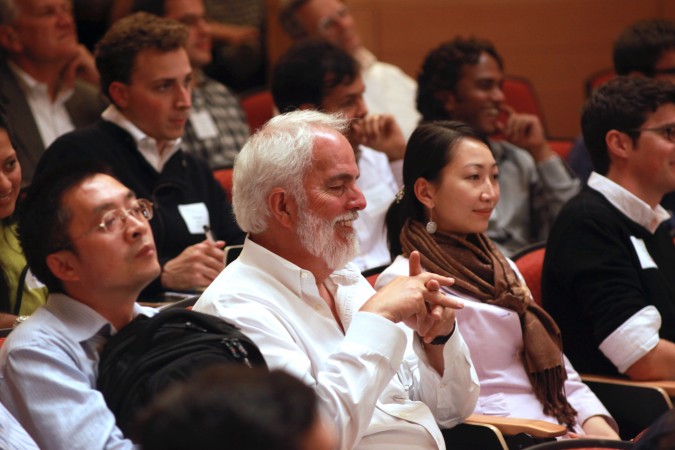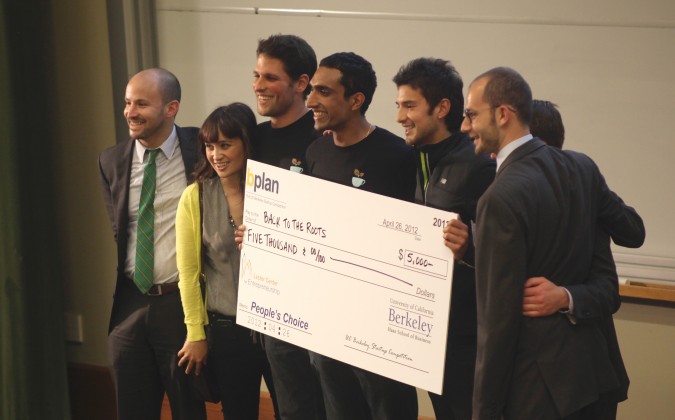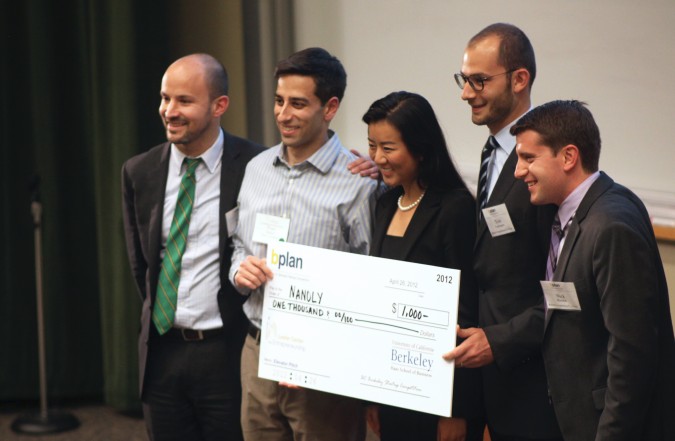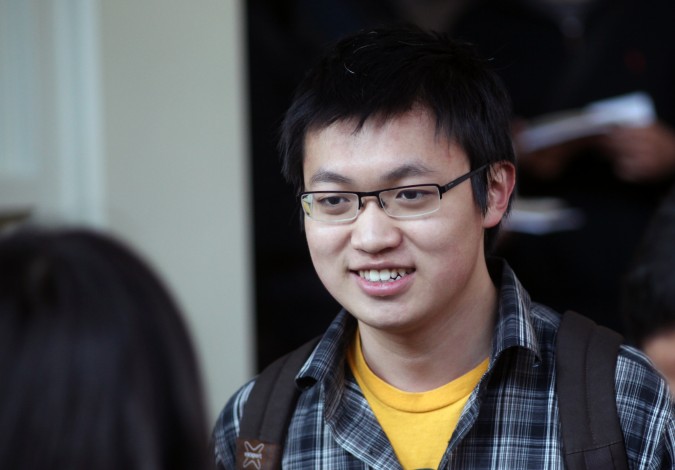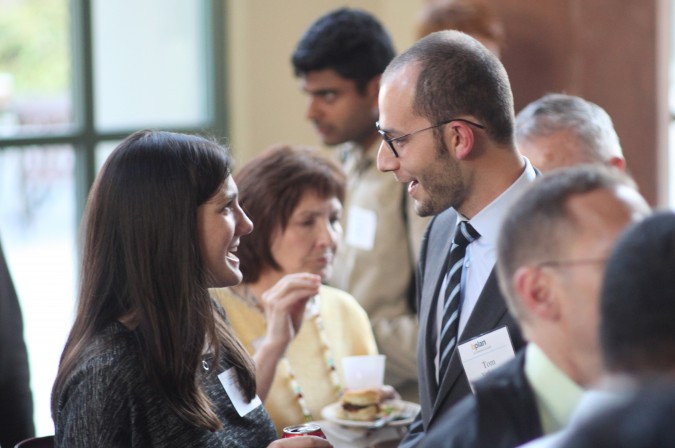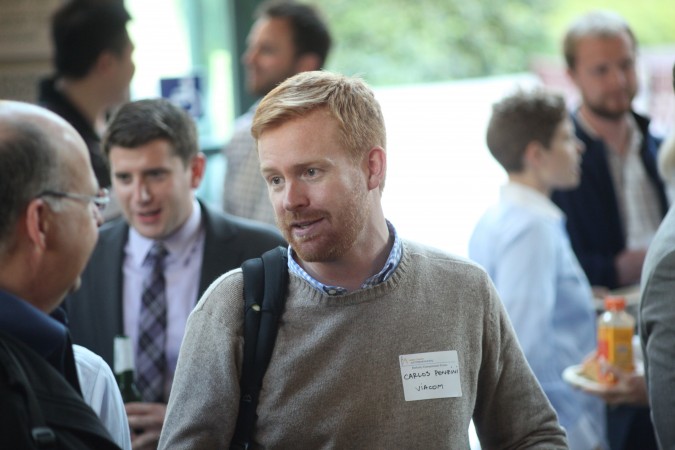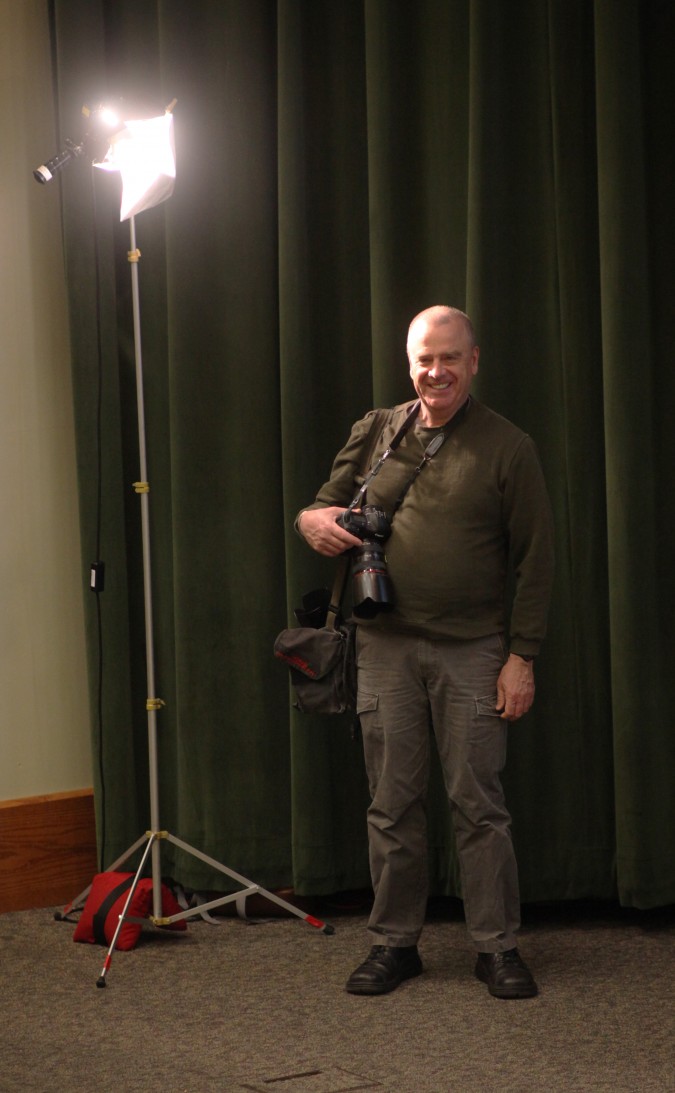Archive for the ‘Bruce Cook’ tag
Berkeley Entrepreneurs Forum, 2012-13 Angel & Venture Capital Financing Overview – August 30, 2012
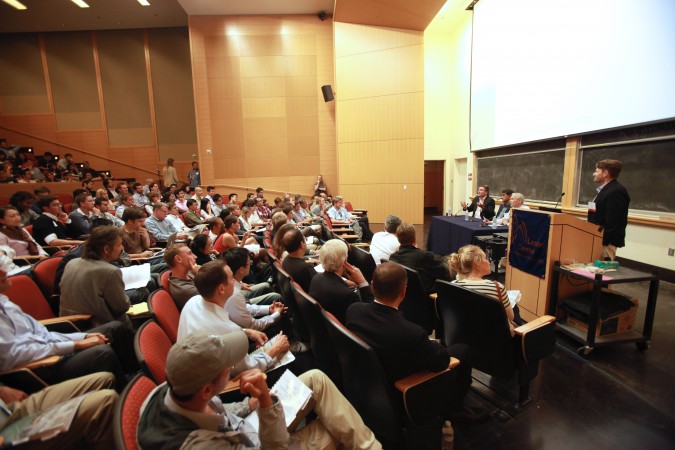
The Berkeley Entrepreneurs Forum, August 30, 2012, held at Stanley Hall, room 105, because Anderson Auditorium was booked
On August 30, 2012 I attended the 2012-13 Angel & Venture Capital Financing Overview at The Berkeley Entrepreneurs Forum.
The August 30th Forum was the first of this academic year. The Berkeley Entrepreneurs Forum is a production of The Lester Center for Entrepreneurship & Innovation at the Haas School of Business at the University of California Berkeley.
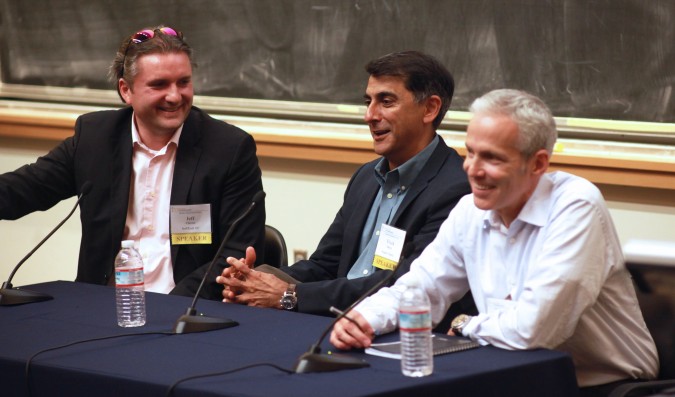
Panelists Jeff Clavier, Vivek Mehra and Jim Barnett at Berkeley Entrepreneurs Forum, August 30, 2012. Photo by Kevin Warnock.
The first Forum of the year for years now starts with Steve Bengston’s presentation of the Shaking the Money Tree report. I suspect Bengston has made this presentation hundreds of times, as he gives it not just at the Forum, but at many venues. In fact, I suspect it’s Bengston’s signature talk.
You can watch the full video of the Forum here to see what happened. I am a photographer, not a videographer. This is not the official video, which The Lester Center will publish in its entirety some weeks from now, I believe. I suggest you watch that version, because it will have professional sound from a mixing board, the slides will likely be full screen so you can read them, and the camera used is far better than the still camera I used that happens to also shoot video. I did not upload this video at full quality, since such video takes far longer to compress for Internet display.
There were some good lines from the speakers. I’ve transcribed my favorites here:
Steve Bengston:
“It [venture capital] finally got big in the mid to late 90s and now we worry when the venture business goes from $30B to $20B, but it never got above $20B until 1998 so the scale of the venture business is just much bigger than it’s ever been.”
“What about Series A, ‘didn’t that collapse?’ It is down certainly from the peak but you can see whatever that is there are $200M to $400M of series A deals each quarter just in Silicon Valley and that represents about 50 to about a 100 Series A deals in Silicon Valley each quarter.”
“The good news is there is a lot of money for your deal if you meet the certain metrics for an investor.”
“If you’re going to raise money which is still hard to do, you’re going to raise around $3M. That’s a typical deal. In this era, that buys you a lot more months of burn than it would have say ten years ago.”
“You have 300 to 400 M & A exits in the US a year in the US, much higher than the old days.”
“The top five or so [venture] firms are raising 80% of the money.”
“It begs the question ‘How many VCs do you need to find the 30 good companies every year?’ Right now the answer is about 3,000. For many people that seems high.”
“China has been the number one economy 15 of the last 18 centuries. So, just because they have had a couple of bad centuries you don’t want to count them out. They are used to being on top.”
Jeff Clavier:
“The challenge at the early stage is that even great founders can come up with really stupid ideas.”
“Do it because you are passionate about it, not because it’s cool.”
“I passed on airbnb that some showed me when it was called air bed and breakfast and I said ‘air bed and breakfast… are you f—ing kidding me?'”
Jim Barnett:
“One of the danger signs that all the partners look for is what we call ‘complexifiers’ — people that take what is otherwise a relatively simple business proposition or business idea and figure out how to make it complex.”
“The one thing I would say to those thinking about starting a company or planning to start a company is just go do it. Your idea really doesn’t need to be that great. It really doesn’t. If you’re great, it will get funded.”
“I want to dispell a myth that you learn more from your mistakes than you do from your successes. I think that is just a bunch of crap. I really do. I think you learn from watching success — pattern matching, whether it’s in sports whether it’s in business or anything else so for those of you that are in the audience that are MBAs or that are undergrads that are thinking about what do if they’re not going to start a company I would say ‘go work for a successful company and watch.’ You’ll learn a lot more than doing three failed startups.”
Vivek Mehra:
“I hate doing deals over the weekend. I have never done one and I hope I never have to do one. It’s just impossible to get to know the entrepreneur.”
“When there are very asymmetric equity assignments amongst the team you know what they really think about each other.”
Here is my succinct summary of this Entrepreneurs Forum:
- The venture industry is in trouble, but there is still plenty of money around.
- Lots of angel investors are making what will prove to be poor investments so this increases the chances that you can raise money even if you or your idea are not that good.
- There is a lot to be gained by just starting a company, so if you are passionate about doing so, then go for it. You won’t ruin your chances for future success by failing a few times.
- However, if you’re not going to start a company, you should work for a clearly successful company so you can pay attention and learn from the success of others.
- Surround yourself with high quality people.
- Don’t make things more complicated than they need to be.
- Have your role worked out with your founders before you pitch to investors. Lopsided equity divisions speak loudly to investors what you think of your co-founders.
- Increase your chances of getting funded by persistently pursuing entrepreneurship over years, so investors may gauge your actions over your words.
- Work hard and recognize that a lot of success may be attributed to your ability to forge healthy and respectful long term relationships with people in the community.
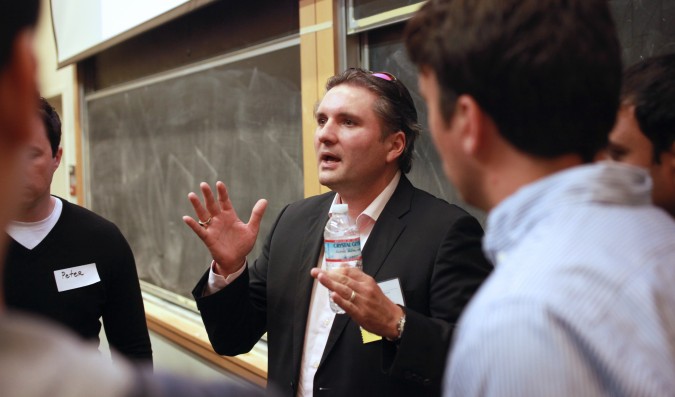
Panelist Jeff Clavier answers questions at the Berkeley Entrepreneurs Forum, August 30, 2012. Photo by Kevin Warnock.
From the Berkeley Entrepreneurs Forum website, here are the introductions for the moderator and speakers — I added the hyperlinks to make it easier for you to learn more about the panelists and their many interests:
Samuel B. Angus
Partner
Fenwick & West LLP
Samuel B. Angus is a partner in the Corporate and Venture Capital Group of Fenwick & West LLP, a law firm specializing in technology and life sciences matters. Mr. Angus is resident in the San Francisco office and his practice concentrates on advising start-up/venture-backed companies, venture capital and debt financings, mergers and acquisitions, intellectual property licensing, joint ventures and general corporate matters. Mr. Angus represents a broad range of companies from privately held start-up companies to publicly traded corporations, including Airbnb, Github, Marin Software and oDesk. His practice also includes advising entrepreneurs and investors.
Jim Barnett
Partner
Shasta Ventures
Jim Barnett is a Partner at Shasta Ventures and has been a highly successful serial CEO and entrepreneur. Jim is currently chairman and co-founder of Turn, chairman of Extole and Sojern, and a board member of Needle and RelayRides. From 2004 until 2009, Jim was CEO, chairman and co-founder of Turn, the leading platform for managing data driven digital advertising. Before that he was president of Overture Search, a division of Overture Services, Inc. Jim joined Overture via its acquisition of AltaVista Company, where he was president and CEO. In this role, he led the company’s successful turnaround and sale to Overture.
Jim was also president of Ancestry.com (MyFamily.com) and president and CEO of ThirdAge Media, which was acquired by Ancestry.com. Prior to that, Jim was president and CEO of Infogrammes North America, a leading global publisher of video games and entertainment software. He was also chairman, president and CEO of Accolade Inc, Infogrammes’ predecessor company, and prior to that was chief operating officer of an “Inc. 100 Fastest Growing Private Companies.”
Jim has served on the boards of many private and public companies including SideStep, Inc. where he was chairman and Petco where he was also an early investor. Jim earned a bachelor’s degree, MBA and J.D. from Stanford University.
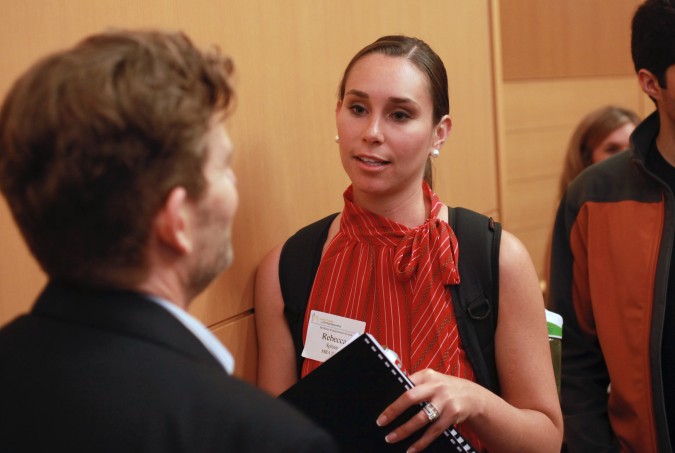
Moderator Sam Angus listens to student Rebecca Spitzer pitch her startup at the Berkeley Entrepreneurs Forum, August 30, 2012
Steve Bengston
PricewaterhouseCoopers
Steve Bengston heads the Emerging Company Services (ECS) group at PricewaterhouseCoopers. ECS acts as “mentor capitalists” for young, high potential companies.
Before joining PwC, Steve had 20 years of experience in a variety of marketing, business development and general management roles at several high tech companies in the Bay Area. Most recently, he was Pres/CEO of ynot.com [Note: not the website now online at that URL], a leading international emarketing and greeting card company. Previously, he was VP Marketing & Business Development at Worldview Systems, an Internet travel pioneer. At Worldview, Steve helped launch and market Travelocity with Sabre Interactive.
Steve has a BA in Economics and MBA from Stanford University. He works closely or sits on the Advisory Board at Churchill Club, SVASE, Life Science Angels, Bay Bio, and the Stanford/MIT Venture Lab, has taught classes on startups at UC Berkeley, San Jose State, Santa Clara Law School, Hastings Law School, and Stanford, and is active in a variety of other organizations in the Bay Area targeting entrepreneurs and investors. He is a frequent moderator/panelist at both university and industry sponsored events.
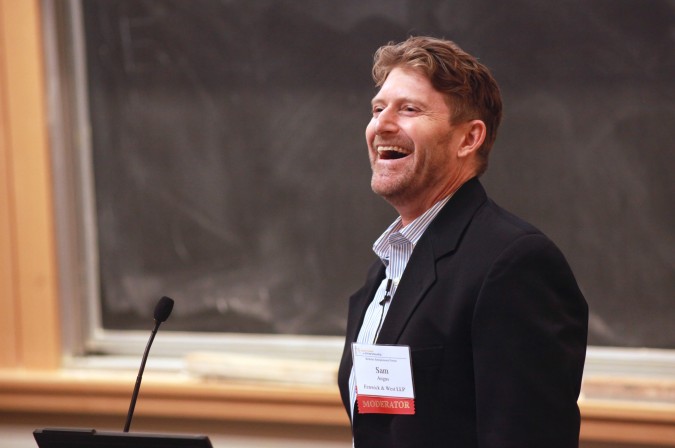
Sam Angus, a partner at law firm Fenwick & West LLP, moderates a panel at the Berkeley Entrepreneurs Forum, August 30, 2012
Jeff Clavier
Founder and Managing Partner
SoftTech VC
Based in Palo Alto, California, Jean-Francois “Jeff” Clavier is the Founder and Managing Partner of SoftTech VC, one of the most active seed stage investors in Web 2.0 startups. Since 2004, Jeff has invested 125 consumer internet startups (Fund I, Fund II, Fund III) in areas like social media, monetization, search, gaming or B2B/B2C web services. These investments are typically located in Silicon Valley, New-York and Boulder. With over 20 years of operational, entrepreneurial and venture capital experience, Jeff is able to add relevant perspective and value to his companies as they grow from inception to maturity, and hopefully, success.
Jeff was recognized as one of the 13 “Web 2.0 King Makers” by (late) Business 2.0. BusinessWeek named him one of “The 25 Most Influential People on the Web” in 2008, and one of the “Top 25 Angels in Tech” in 2010. He was also nominated in the “Best Angel” category at the Crunchies in 2009 and 2010. He is often noted for his investments in categories such as “passion-centric communities” or online gaming, or for having sold a number of his Web 2.0 startups to the likes of Yahoo, AOL, Intuit or more recently PayPal, Twitter and Groupon.
Some of Jeff’s representative investments include Mint (Intuit), Brightroll, Truveo (AOL), Userplane (AOL), Rapleaf, Ustream, Milo (eBay), Blekko, Eventbrite, Tapulous (Disney), DNANexus, FanBridge, BillFloat, Fab, Gigwalk, Byliner and Wildfire.
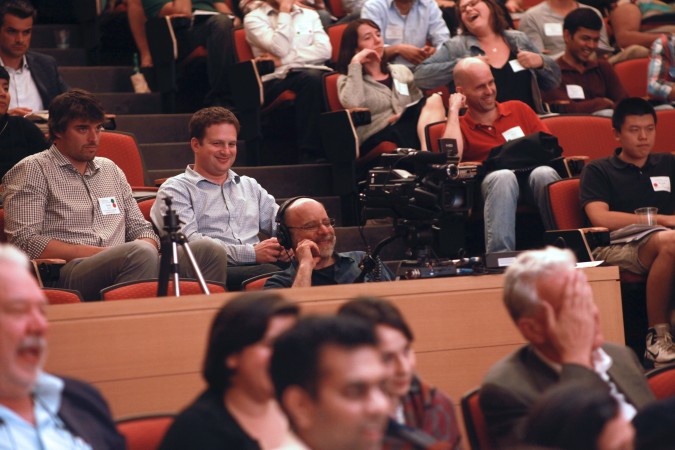
Stuart Sweetow, owner of Audio Video Consultants, capturing video at the Berkeley Entrepreneurs Forum, August 30, 2012
Vivek Mehra
August Capital
Vivek joined August Capital in 2003. He invests broadly in IT infrastructure and areas of interest include data center technologies, systems management, security, storage, and cloud computing systems and software. Prior to joining August Capital, Vivek co-founded Cobalt Networks in 1996. As CTO & VP of Product Development, Vivek built the first successful server appliance and grew Cobalt into a worldwide leader in the category, culminating in a successful IPO and acquisition by Sun Microsystems for $2B. At Sun, Vivek served as the Vice President and General Manager of the Cobalt Business Unit and a member of Sun’s Technical Architecture Council. Prior to founding Cobalt, Vivek held a number of technical and management positions at Apple, SGI, and Digital Equipment Corporation and successfully developed numerous products including Internet enabled set-top boxes, PDAs, RISC workstations, and high performance graphics subsystems.
Vivek received a BS in Electronics from Punjab University, India, and an MS in Computer Engineering from Iowa State University.
To my knowledge, I have been attending The Berkeley Entrepreneurs Forum for longer than anyone else besides Jerry Engel, who founded The Lester Center in 1991 and was its Executive Director for nearly two decades.
I have some suggestions to improve the The Entrepreneurs Forum, which I will describe here. I am posting these suggestions publicly because they are likely applicable to numerous programs across the globe, and I’d like to see these ideas adopted widely if people think they are worthwhile.
1. Dispense with the table panelists sit at. The table doesn’t look good on camera or video, and over time the majority audience for the Forum should be watching online, since the rooms frequently sell out already. Panelists should sit on arm chairs or couches, like they do at most tech conferences that I attend. The moderator should sit with the panelists and not be off to the side standing at a podium. All the people on stage should be outfitted with wireless lapel microphones. I would like the Forum to appear more conversational in style. The table separates the speakers from the audience, where arm chairs suggest a residence for a more intimate vibe.
Here’s an example of a more visually appealing way to run a panel. Steve Bengston is the moderator for this panel at The Churchill Club, where he is a member of its Board of Directors and its past Chair.
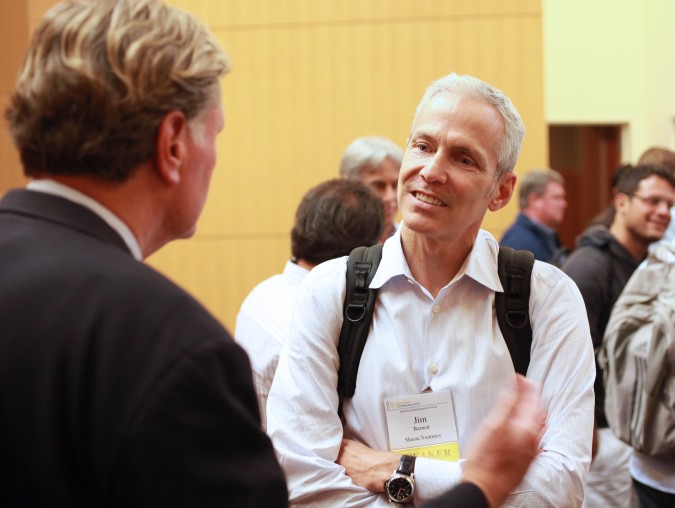
Jeff Burton, the brand new Executive Director of the UC Berkeley Skydeck, talks with Jim Barnett of Shasta Ventures, August 30, 2012
2. Commercial bottled water should be forbidden on stage, even if the speakers bring it with them. Nearly all the conferences I attend serve water from pitchers into real glasses. Bottled water is an evil product, and it looks bad in photographs and video to see those bottles. Image is important, and promoting bottled water by showing it on stage should stop.
3. Commercial bottled water should not be a beverage choice during the networking hour. Tap water should be offered, and it should not require a drink ticket.
4. When it comes time for audience questions, invite the questioner to sit on stage in an arm chair or on the couch while they ask the question and while they are receiving the answer. This will give the questioner time on video, and will permit them to look the speakers in the eye. This will be a treat for the audience members, because they’ll feel they get to ‘meet’ the panelists for 60 or 120 seconds. Questioners can line up to get their turn on stage. Questioners should be encouraged to state their first and last name, so they can be identified online.
5. Although I appreciate that it’s a lot of work, the Forums should be transcribed, and the transcribed text should be posted online. This is a certain way to get more traffic to The Lester Center website, and it’s likely to increase the interest in the Forum from attendees that can’t attend in person.
6. All Forums should be archived online, including Forums from ten and twenty years ago. Forums should never expire and be removed.
7. The ‘numbers’ should be videotaped and included in the online video. The numbers are often the most interesting part of the evening. The contact information for the number presenters should be posted online, with permission of course, and there should be a hyperlink to the project the person is working on.
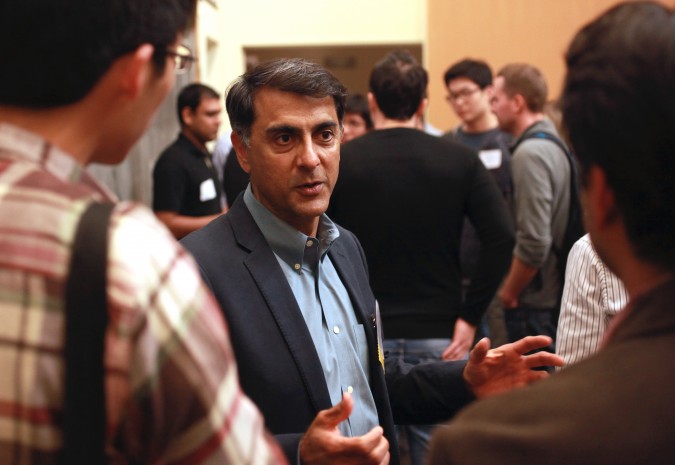
Vivek Mehra, a partner at August Capital, answers questions posed by attendees at the Berkeley Entrepreneurs Forum, August 30, 2012
8. The photographs taken by Bruce Cook, the official photographer, should be publicly posted to Facebook, and should be tagged. Once the identities of the people pictured are known via the tagging, the captions for the official Lester Center website should be updated to identify everyone whose name is known. If required, change the terms of the tickets purchased to give UC Berkeley the right to identify the people by name. Offer an ‘opt out’ list during checkin. Having the names with the pictures will increase traffic to The Lester Center website, since people will search for those names for decades to come. Invite people to tag the pictures in the emails The Lester Center sends out and via Facebook status updates.
9. A vast collection of at least 5,000 of Bruce Cook’s unpublished photographs of the Forum from the last twenty years should be published to Facebook and the Web, and they should be tagged and captioned. This was entirely my idea — Cook did not hint that I propose such an idea. The majority of the pictures published should be of the networking hour, to get as many people from the audiences over the years tagged as possible.
10. The Forum should be oversold, like airplane seats. This August 30th Forum was ‘sold out’ but there were unfilled seats in the auditorium, which takes away from the excitement of a sold out show. If too many people show up, they can watch on video monitors in the Bank of America Forum, and as compensation for not getting a seat, their entrance fee can be 100% refunded. I predict the revenue over time from overbooking will more than make up for the refunds that need to be given. Attendees should be told when they buy their tickets they risk being bumped, and encouraged to arrive early to be sure they get a seat.
11. The reminder to ‘Like’ The Lester Center on Facebook should be repeated on a poster displayed during the Forum. The Forum’s Twitter handle should also be on this poster.
12. Attendees should be given a perk if they follow the Forum on social networks, such as a second drink ticket on their next visit to the Forum, to encourage getting as many followers as possible. Currently attendees may eat unlimited quantities of food at the Forum, but are permitted only one drink, either with alcohol or without.
13. Attendees should be invited to blog and post about the Forums, and The Lester Center site should find and link to the best examples of such efforts, to encourage people to write about the Forum.
I am one of the only bloggers writing about the Forum, but there should be at least several.
14. I love the luxurious food served during the networking hour, but it sure seems like it must cost a fortune. I think it would be more than fine to switch to less fancy food. There is precedent for this. Last year at the Founder School Demo Day what appeared to be inexpensive sandwiches were served, but the event was superb and not diminished by the more everyday food. I suspect the food budget for the Forum could be cut by two thirds without getting more than a handful of complaints. The Forum is still too expensive at USD $25 a ticket, and I bet it loses money even at that price. When I started attending in my mid twenties, the cost was prohibitive. It was only due to my getting free tickets from my employer at the time, Cooley, that I attended regularly. The goal should be to get lots of currently poor entrepreneurs in the making to attend, including but not limited to Berkeley students.
I suggest the price should be no more than $10. To get the price that low, I suggest alcohol should cost extra.
That is all my suggestions for now. The Forum is already a success, or I would not have attended for twenty years. I am trying to make the Forum better.
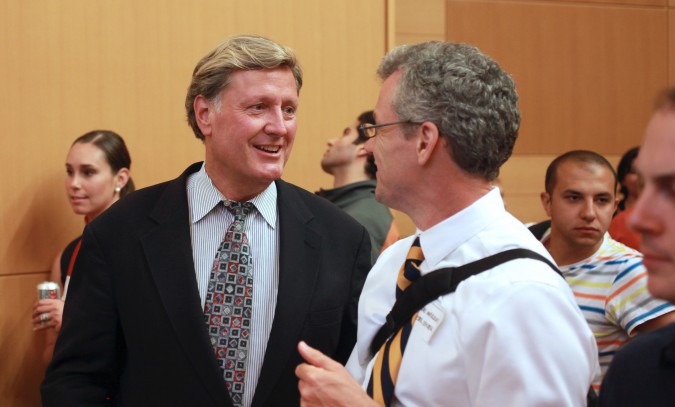
Jeff-Burton, left, the brand new Executive Director of the UC Berkeley Skydeck talks with Andre Marquis, Executive Director of The Lester Center for Entrepreneurship & Innovation, August 30, 2012. Photo by Kevin Warnock.
I upload pictures to this blog at the maximum resolution my camera produces — 21 megapixels. Click on them twice in delayed succession to see them at full size. I shot these pictures at ISO 4,000 due to the low lighting levels.
Click here to see all the posts I have written about the Berkeley Entrepreneurs Forum.
The law firm Fenwick & West LLP where Sam Angus is a partner produced and gave away a great 80 page booklet at the Forum. Retired Fenwick attorney Jacqueline Daunt wrote a fantastic introduction to startups that includes a capitalization table for a hypothetical company from pre-funding stage through a public stock offering. Thank you Fenwick! If I can post this booklet, please let me know and I’ll update this post with a link to a PDF scan of the booklet.
Finally, as an end note, I met Steve Bengston in 1999 during the first dot com boom, when he agreed to help me with Hotpaper, my startup at the time. It turned out I didn’t call on him much, since I lined up financing almost too easily, but I will never forget pitching him at his PriceWaterhouseCoopers office in San Jose, California USA, and him telling me at that meeting that he would help me. Bengston is well known, and I was thrilled to have his support, especially back then when I didn’t know many people or know much of anything.
2012 Berkeley Startup Competition Finals at University of California Berkeley
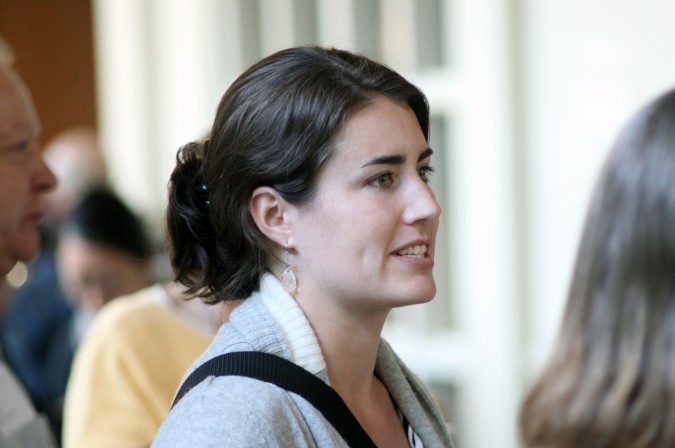
Kate Garrett, co-founder of Calcula Technologies, Grand Prize winner of the 2012 Berkeley Startup Competition, April 26, 2012
On Thursday, April 26, 2012, I attended the Berkeley Startup Competition Final Awards Ceremony at the Anderson Auditorium on the campus of The Haas School of Business at the University of California at Berkeley. Here is the PDF format file of the 2012 Berkeley Startup Competition Final Awards Ceremony program booklet that was handed out at the final awards ceremony.
There are many people mentioned in the booklet, like the Co-Chairs for the 2012 competition, Nick Nascioli, Adam Sterling and Tom VanLangen, as well as Lester Center Executive Director Andre Marquis and Haas School of Business Dean Richard Lyons.
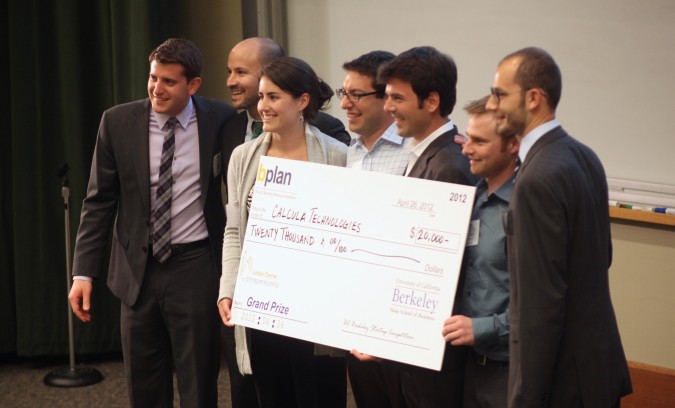
Grand Prize winner Calcula Technologies at the Berkeley Startup Competition, April 26, 2012. Left to right: Nick Mascioli (co-chair of the Competition), Adam Sterling (co-chair of the Competition), Kate Garrett, Dan Azagury, David Gal, Buzz Bonneau, Tom VanLangen (co-chair of the Competition)
I most recently wrote about the announcement of the finalists for this competition, which happened two days earlier, on April 24, 2012.
Calcula Technologies won the Grand Prize and the Life Sciences Track for their clever system that vacuums kidney stones out of a patient’s urethra in just ten seconds. According to the team’s presentation, doctors today let stones pass from the body naturally and often quite painfully unless they are larger than 10mm in diameter. Patients today are often in such agony that they visit the emergency room, which racks up hundreds of millions of dollars in charges per year. For the sub 10mm stones, doctors just write prescriptions for narcotic pain killers and send the patients home with the stones still on their excruciating slow path out.
In the future, when and if Calcula gets their system approved by regulators, patients could have a catheter inserted into their urethra and the stone could be sucked out in seconds, presumably at great relief to the patient. This work could be done at the office of a urologist, without surgery, and the Calcula team said there is already a prized and lucrative reimbursement code in existence in the insurance industry, so if they build this system, they will be able to get paid and make a profit. I can understand why Calcula Technologies won the grand prize. Kidney stones are no fun, I’ve heard, and this system seems very appealing. The team showed a video of a fake kidney stone being sucked out of a pig’s urethra in just 10 seconds. It was very impressive and very memorable.
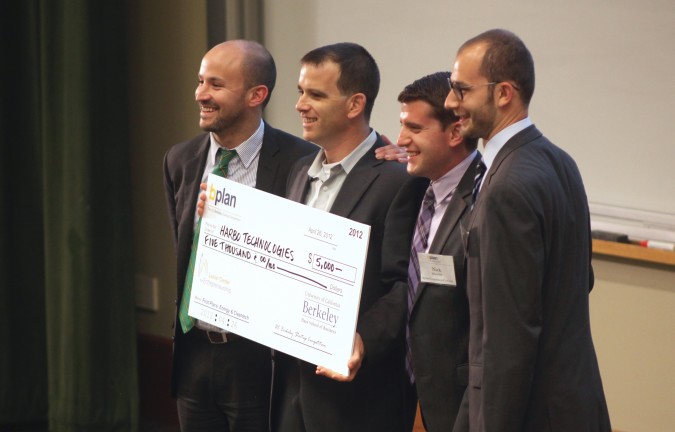
First Place Energy and Cleantech winner Harbo Technologies at the Berkeley Startup Competition, April 26, 2012
Kloudless, Inc. won first place in the Information Technologies and Web Track. I am going to be interviewing Kloudless, so I’ll save my remarks for another blog post.
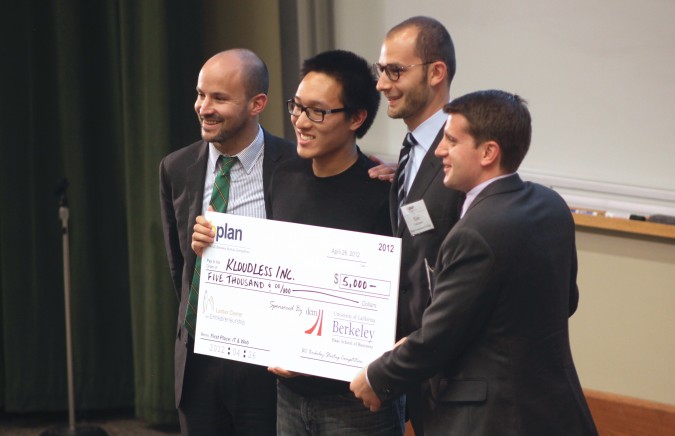
First place IT and Web Track winner Kloudless, Inc. at the Berkeley Startup Competition, April 26, 2012
Like Calcula, Back to the Roots (2935 Adeline Street, Oakland California 94608 USA) won two awards. First, they won the Products and Services Track, and then, thanks to real time votes from the audience and viewers of a live stream on the Internet, they won the Peoples’ Choice Award.
I have written about Back to the Roots twice before.
I have one of their products at my house right now. It works.
Back to the Roots collects used coffee grounds from coffee houses like Peet’s Coffee and mixes it with a ‘secret sauce.’ The combination is boxed up and sold at over 1,000 stores in the United States, including at Home Depot and Whole Foods Market. A consumer buys the cardboard box and partly opens it, exposing the insides. The consumer then mists the contents of the box with water using an included spray bottle. After ten days of twice daily misting, the consumer harvests a bountiful crop of oyster mushrooms that have grown directly out of the side of the box. Once one side has been used up, the consumer opens the other side to repeat the growing cycle for a second harvest.
That story has been told thousands of times, including on the CBS Evening News, an influential national newscast in the United States.
During their public presentation, the Back to the Roots team disclosed future plans that I find fascinating. Since this event was public and was streamed live to the Internet, I feel that it’s OK to write about what I learned, as there were no statements that anything said was to be considered secret.
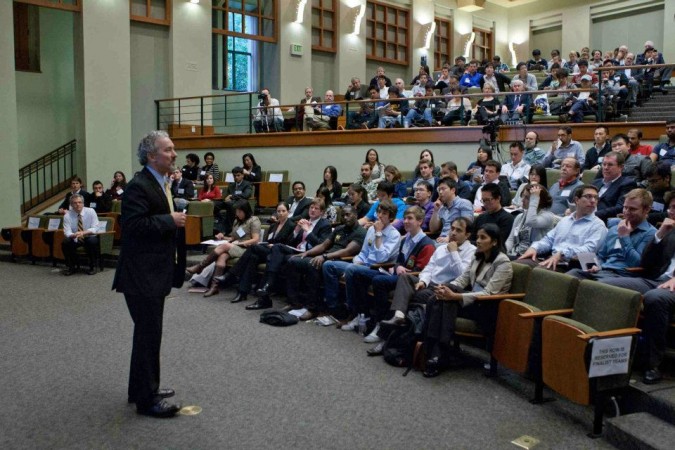
Haas School of Business Dean Richard Lyons speaks at the Berkeley Startup Competition Finals, April 26, 2012. Photograph by Bruce Cook.
The box contents will soon include vegetable plant seeds, and the rest of the box and liner will be biodegradable. Currently, the box is lined with what looks like conventional plastic. My box is from November, 2011, so things today may be different. In the future, or perhaps even already, the box will be lined with either nothing or something else that’s biodegradable. Perhaps what looks like conventional plastic to me is really biodegradable plastic, like some plastic trash bags are made of.
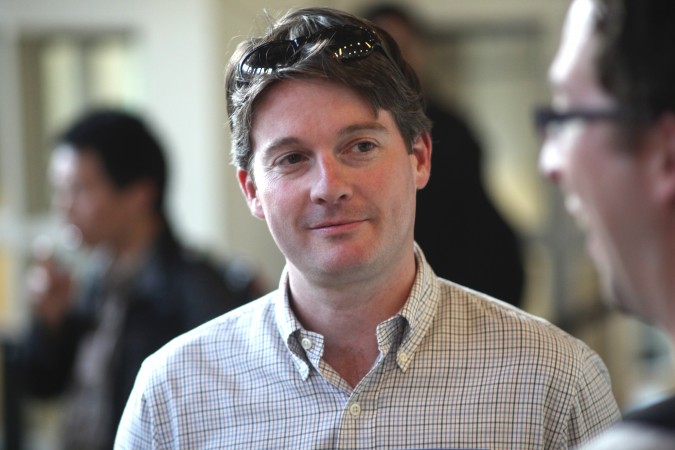
Venture capitalist Michael Berolzheimer, of Bee Partners, attends the Berkeley Startup Competition, April 26, 2012. Berolzheimer also leads the Haas Founders group that I am a member of.
Why do this?
Once the box is biodegradable and contains vegetable seeds, that means that after the two mushroom harvests the box can be planted in dirt for ’round three’ of production — vegetables. The mushrooms came from the waste stream from coffee houses. The round three vegetable garden will come from the waste stream of the mushroom garden.
This is beautiful.
What’s coming down the road from Back to the Roots?
I am overjoyed to report the answer may be affordable aquaponics kits.
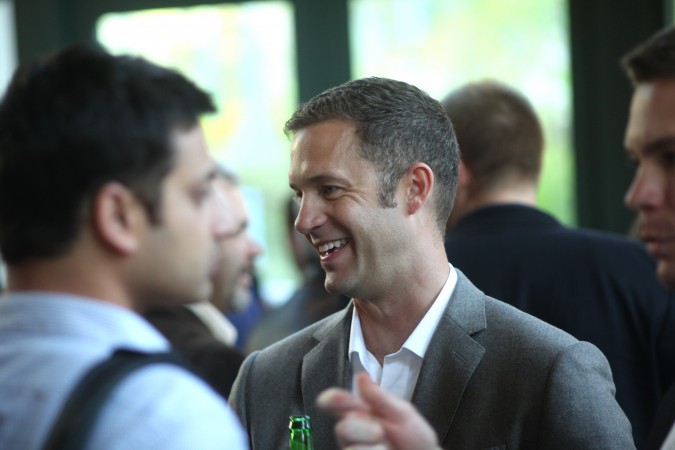
Kevin Esse at networking hour prior to attending Berkeley Startup Competition Finals, April 26, 2012
I have written before about my love for aquaponics.
Aquaponics is food production gardening enhanced by growing edible fish in symbiosis with vegetable plants. Both parts of the system are made more productive by the presence of the other half. Fish poop gets converted by bacteria into rich fertilizer. The fish grow faster because the plants keep the fish tank cleaner. It’s a great growing system that I feel should take over the world on such a scale that every person has their own system at home.
I am too busy in life to advance this dream, but the team at Back to the Roots has time and energy and market traction, so I think they would be ideal to push aquaponics to a large audience. I am so excited about this that I have already offered to tell the company everything I know about aquaponics free of charge to encourage them to get this to market.
I suspect they plan to start with small, under USD $100 demonstration kits. This in my mind is the way to start.
I bought my startup supplies for my aquaponics system from The Aquaponics Source. This online retailer sells complete systems, but the price is too high for people to buy casually, at over USD $1,000. I believe a profitable sub $100 kit could be sold, as what’s required is similar to what’s inside a Mr. Coffee brand coffee maker — two water containers, a pump, a heater and some electronics to coordinate the steps. I can get a nice computerized Mr. Coffee coffee maker for about USD $25 from Amazon, so even in the smaller quantities a demonstration aquaponics system would sell in initially, I think it can be done.
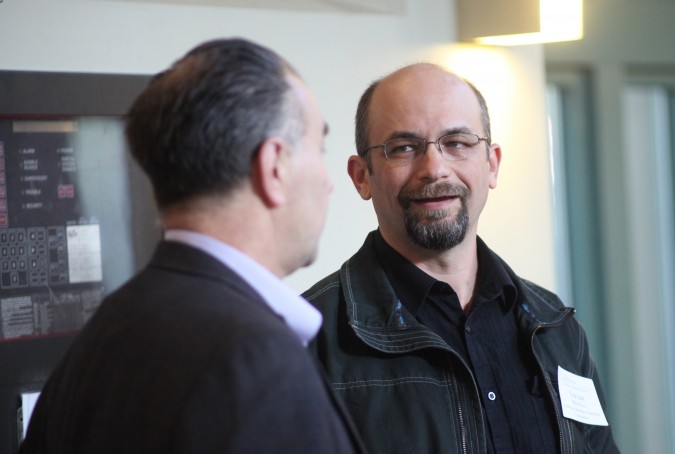
Lucian Mihailescu of Lawrence Berkeley National Laboratory attends the Berkeley Startup Competition, April 26, 2012
I love advising startup companies, and I would particularly like to advise about aquaponics, even though I know relatively little about the subject, since I’ve only built one demonstration system so far. My system was a modest success for I grew the largest and sweetest tomatoes I have ever eaten.
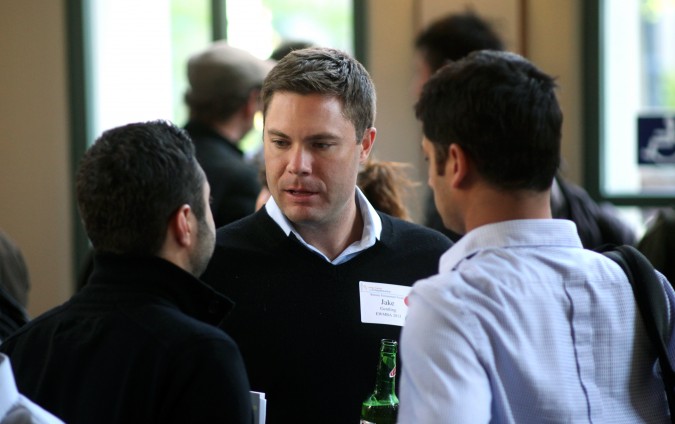
Jake Gentling at the networking hour prior to attending the Berkeley Startup Competition Finals, April 26, 2012
HARBO Technologies won First Place in the Energy and Cleantech track. I introduced myself to co-founder Boaz Ur and mentor John Matthesen after the conclusion of the event. The company is working on something I find impressive and interesting. I have made arrangements to interview the team, so I will hold my remarks until after that interview.
My friends at Modify Industries took home a USD $1,000 prize for coming in second place in the Products and Services Track. This outcome was inevitable, and I predicted it accurately the moment I saw Modify was competing with Back to the Roots. Back to the Roots simply has had much more commercial success so far. While Modify has sold between 10,000 and 100,000 watches to such companies as Google and Hewlett Packard, they haven’t yet cracked the retail store market, and they haven’t been on the evening television news. It’s rare for a company to be so far along like Back to the Roots, but still be eligible to compete in the Berkeley Startup Competition. In all other years where there was a Products and Services Track, Modify probably would have won that track. I pay attention to these things because I was a judge for this competition for the eight years through 2011. This year I mentored the team University Gateway, which did not make it to the finals since Modify and Back to the Roots filled up the Products and Services Track.
Modify gave an impressive and bold presentation, where they outlined a dream for their enterprise far bigger than time pieces. They probably adjusted their pitch to compete with Back to the Roots. But they forgot to show their product in action amid all the grand dream spinning. How so? They forgot to personally show the audience how to change a watch element from one silicone strap to another. This is worth showing at every pitch for it’s compelling and like nothing I’ve seen in the watch business. No tools, no training — 10 seconds and you have an all new look.
Finally, I want to give some space to my friend and fellow photographer Bruce Cook. I’ve known Cook since nearly the inception of The Lester Center for Entrepreneurship & Innovation. He’s a fixture at all sizable Lester Center events. He has his own photography business, Bruce Cook Photography, and is not a University of California employee. I can’t recall there ever being a different photographer for a Lester Center event. The picture above is of Cook standing under the video light in Anderson Auditorium. The picture below is of Cook taking a picture during the networking hour in the Bank of America Forum, the large gathering area just outside of the Anderson Auditorium. Cook took the picture above of Dean Lyons speaking to the audience. Thank you Bruce!
If The Lester Center is reading this, may I suggest that you contact Cook and work out a deal where his vast library of photographs of Lester Center events over the last twenty years can find a permanent home on the Lester Center website and in the University library system. Cook has photographed some of the most important figures of our time, and the tremendous majority, over 99%, of his photographs have not been published. I think these photographs should also be published on Facebook so that it’s easy to crowd source the identification of the people in the pictures, via the Facebook tagging system. Once the faces are tagged, then the captions on the Lester Center website can be updated to reflect the identities of those pictured.
Why do this?
The Lester Center and its events are documenting history. It’s that simple. Bruce Cook has a treasure trove of historic pictures that few have ever seen.
As an added bonus, publishing and captioning Cook’s 100,000+ pictures will boost traffic to The Lester Center’s website, as people search on Google and similar sites for the many luminaries Cook has photographed. The search engine optimization benefits to posting these pictures will probably overshadow every other single project you could undertake.
This is my idea alone.
Cook did not plant this, suggest this or hint at this.
I’ve been thinking about this for years now, and here seems like a fine place to promote the idea.
I believe I have shared this suggestion with Jerry Engel when he was Executive Director of The Lester Center, but that was only in passing at a hectic Berkeley Entrepreneurs Forum, not a written proposal such as this one.
Please consider this official advice, and let me know when I can blog about the happy news. Thank you.
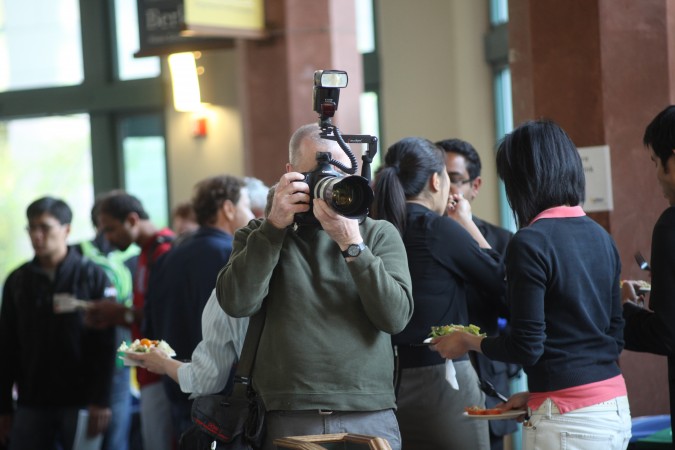
Bruce Cook, the photographer for The Lester Center events, covers the Berkeley Startup Competition, April 26, 2012
I introduced myself to all the finalist teams except AdrenaRX. I believe the members from that team departed before I had a chance to find them.
I offered each of the eight finalist teams except for Modify and Back to the Roots the opportunity to be interviewed by me for a future blog entry. Two of the teams have contacted me to schedule an interview. Four teams have not yet contacted me.
I know the Modify and Back to the Roots founders, so I did not offer to interview them. This was not meant as a snub — I simply forgot to offer in my excitement of congratulating them. Both teams are doing so well they don’t need my blog coverage, but if they would like more in depth stories, I am happy to meet with them. Just send me a message. I am on Facebook and easy to reach. I have turned on the ‘subscribe’ feature, so everyone reading this is invited to subscribe to me on Facebook. You may also sign up with your email address to receive updates to this blog, in the upper right corner of this page.
All the pictures I presented above except for the one by Bruce Cook are also on my Facebook page in this album. If you know these people, particularly the people in the shots with the giant checks, please tag them on Facebook so I can update the captions here with the names. All my pictures on Facebook are public, so if you tag someone there, I consider those names to be public, and on that basis I will update the captions here.
The sponsors for the 2012 Berkeley Startup Competition include:
Gold level:
Claremont Creek Ventures
DCM
UM
Silver level:
Javelin Venture Partners
Lowenstein Sandler
Mintz Levin
Mohr Davidow
Morgan Stanley
Morgenthaler Ventures
Morrison & Foerster LLP
Wilson Sonsini Goodrich & Rosati PC
Individual level:
There were possibly other individual sponsors. No individual level sponsors were listed in official materials this year, a departure from past years.
The Executive Committee for the 2012 Berkeley Startup Competition:
Co-Chairs
Nick Mascioli
Adam Sterling
Tom VanLangen
Judging & Sponsorship
Robbie Allan
Jane Buescher
Vivien Leong
Larry Pier
Marketing & Events
Stephanie Knoch
Krishna Shah
Mentorship & Events
Amara Aigbedion
Hrishikesh Desai
Program Manager
Kirsten Berzon
